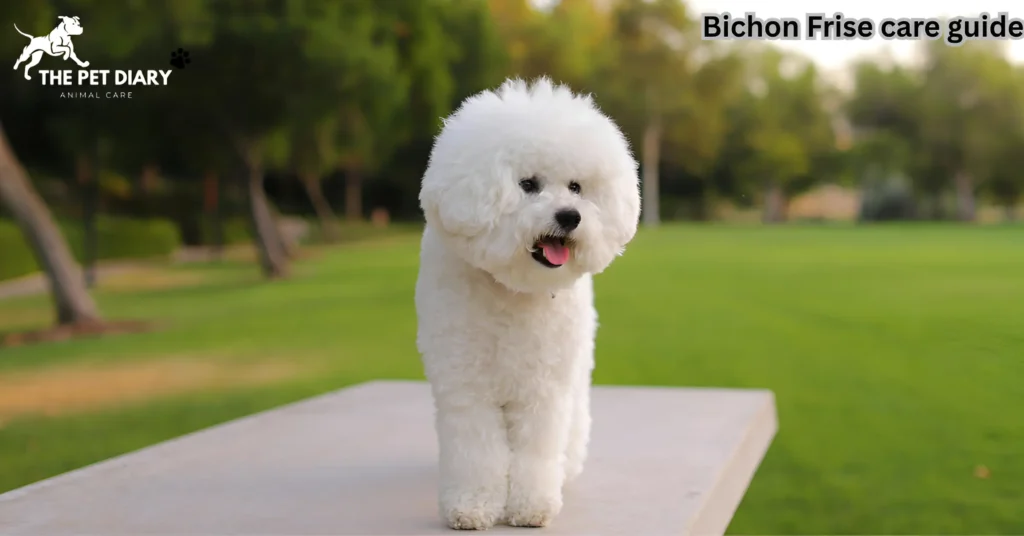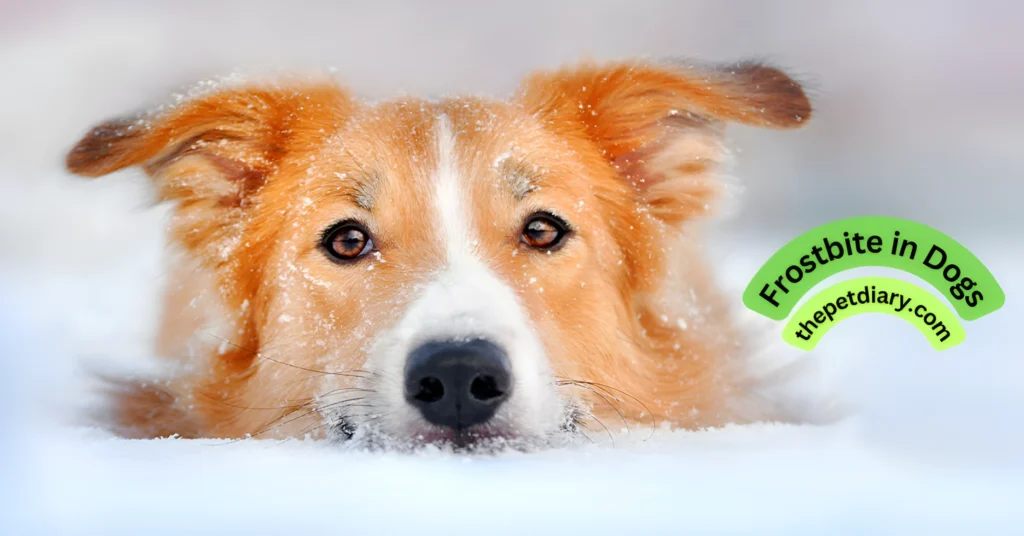The Bichon Frise is a playful and loving small dog breed that belongs to the non-sporting group. Bichons get along with kids and other animals, are inquisitive, and love meeting new people. Understanding their needs through a proper Bichon Frise care guide is essential for keeping them healthy and happy.
The Bichon Frise weighs between 12 and 18 pounds on average and is slightly under 1 foot tall despite its large personality. They are known as a “hypoallergenic” breed since they don’t shed as much as other dog breeds, although all dogs, including Bichon Frise, have allergens in their skin, saliva, and urine. That being said, some people with dog allergies may find Bichons to be an excellent choice.
Bichons Frise are closely related to dogs of the Barbichon breed, including the Bolognese, Havanese, and Maltese.
Caring for a Bichon Frise
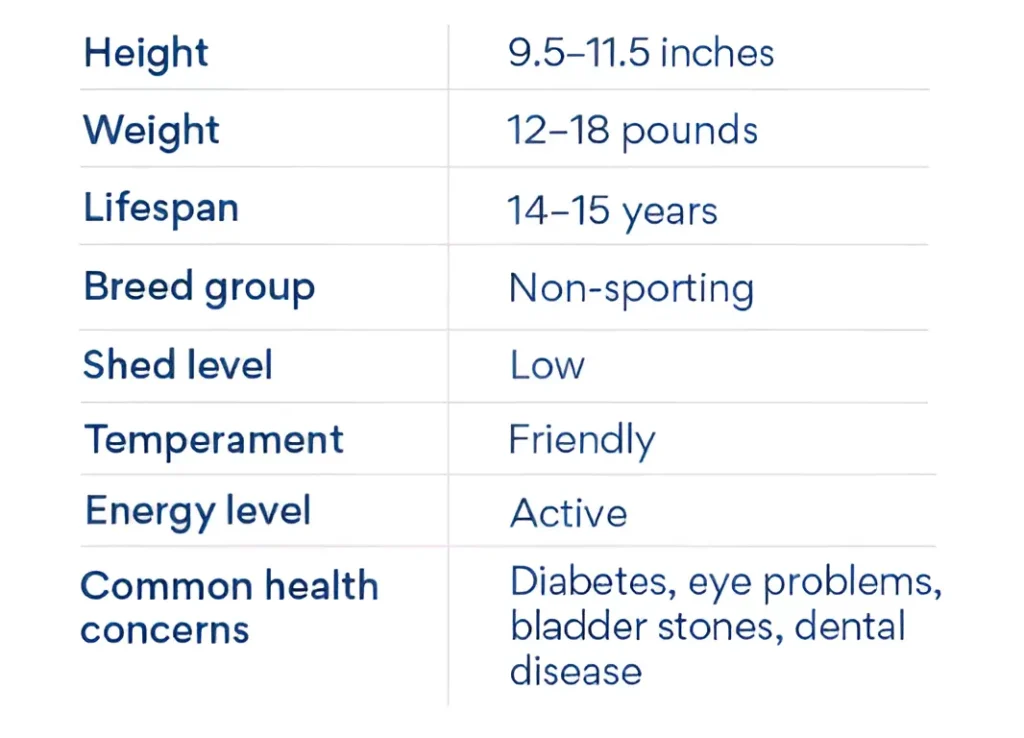
The Bichon Frise would rather play, socialize, and play some more. Some of their favorite pastimes are playing with their favorite toys and picking up new skills. Bichons are happy to relax on the couch with their loved ones after their energy requirements are satisfied.
Bichons are perfect for apartment living due to their petite size. Any household, particularly those with new pet owners, can benefit greatly from having them as pets. Despite their propensity to bark when startled by unfamiliar noises, Bichons Frise are easily trained due to their intense desire to please their owners.
Bichon Frise Health Issues-Bichon Frise Care Guide
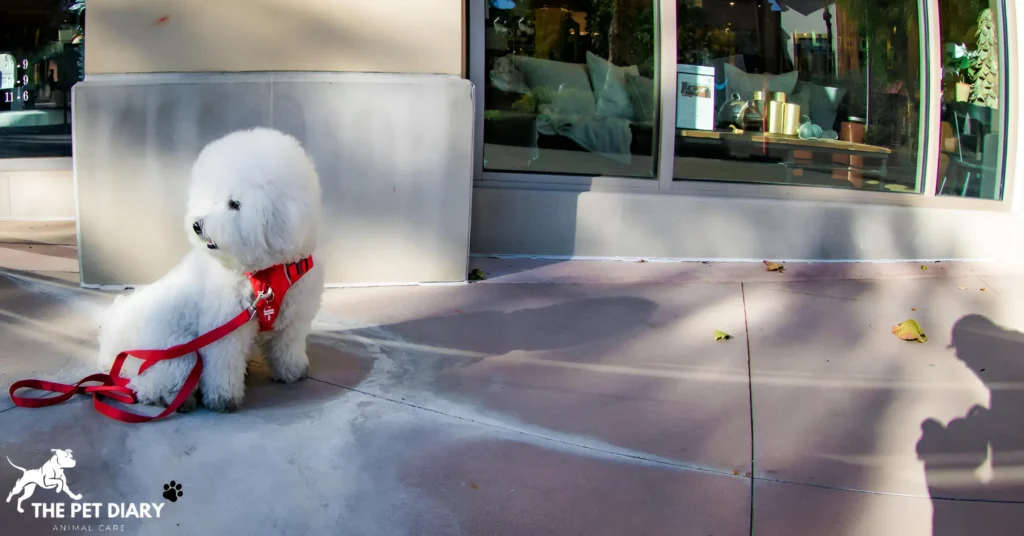
Although Bichon Frises typically live 14–15 years, they may experience a few common health issues over that time.
For people who are considering adopting a Bichon Frise puppy, pet insurance might be a wise purchase.
🐾Diabetes Mellitus
Diabetes in dogs is caused by the pancreas’s incapacity to regulate blood sugar levels. This results in elevated blood sugar, necessitating daily insulin injections and a veterinarian-recommended special diet.
Typical signs of diabetes include:
- Increased thirst
- Increased urination
- Weight loss
- Increased appetite
Take your Bichon Frise to the veterinarian for a physical examination, a full blood panel, and a urine analysis if you observe any of these symptoms. Dogs with diabetes can lead long, fulfilling lives if their condition is properly managed.
🐾Corneal Dystrophy
Corneal dystrophy, which can strike your dog as early as age two, is thought to be a genetic condition in Bichon Frises. The hallmark of this condition is the development of an opaque (light-blocking) region in the middle of the cornea, the eye’s outermost transparent surface. The Bichon’s vision may be impacted by this.
Unless it progresses to the point where an eye ulcer develops, corneal dystrophy typically doesn’t hurt or need to be treated.
If you see your dog rubbing, scratching, or squinting at their eyes, take them to the veterinarian immediately. If a bichon has an eye ulcer, they might be referred to an eye specialist for assessment.
🐾Cataracts
Another eye ailment that Bichons Frise might get is cataracts. This is probably inherited and could start to manifest as early as six months of age in Bichon Frise puppies.
Surgery can be used to repair cataracts, which impair vision. You should speak with your veterinarian if you notice any changes in your dog’s eyesight. For additional care, your veterinarian could recommend that you and your dog see a veterinary eye specialist.
🐾Bladder Stones
Urolithiasis, also known as bladder stones, is the term used to describe the development of calcium oxalate, cystine, struvite, or calcium phosphate stones in the bladder. This may be caused by nutrition, owing to urinary tract infections, or genetics.
pee with a strong odor, blood in the pee, or difficulty urinating are all signs of bladder stones. A veterinarian may recommend a special diet to dissolve bladder stones or remove them surgically.
🐾 Dental Disease-Bichon Frise Care Guide
The Bichon Frise is extremely vulnerable to dental disease, just like any other little white dog. Plaque and tartar accumulation is the source of this, which can result in tooth loss, discomfort, foul breath, and, in extreme situations, organ damage.
The best defense against dental disease is prevention. A veterinarian should examine and clean a Bichon’s teeth at least once a year to avoid gum disease, tooth loss, and exposed tooth roots. To cure early dental disease. Additionally beneficial is brushing your dog’s teeth at home using toothpaste and a toothbrush made specifically for dogs.
What To Feed a Bichon Frise
Bichon Frise dogs should be fed a high-quality commercial food that meets the Association of American Feed Control Officials‘ (AAFCO) nutritional requirements. The meal should be prepared according to the stage of life of your dog, which means:
- Bichon Frise puppies get high-quality puppy food.
- Adults must transition to adult dog food.
- Seniors may benefit from senior dog food.
How Much Should You Feed a Bichon Frise?
To ensure that your Bichon Frise is receiving the right amounts of food, carefully adhere to the feeding guidelines provided by the dog food manufacturer on the container. Depending on your Bichon’s weight, body condition score, health, and lifestyle, your veterinarian might offer you even more detailed feeding advice.
Don’t overfeed your Bichon Frise because obesity in dogs can develop and worsen other health problems. No more than 10% of your dog’s daily caloric intake should come from dog treats.
How To Feed a Bichon Frise
An adult Bichon Frise dog should eat at least twice a day. Puppies of the Bichon Frise breed may require more frequent feedings to lower their risk of hypoglycemia, or low blood sugar. See your veterinarian for guidance on the best feeding schedule for your dog.
The Bichon Frise likes to solve puzzles and play games. Therefore, you can use interactive food puzzles, lick mats, and snuffle mats to conceal their food rather than giving them food from a standard dog bowl.
🐾Nutritional Tips for the Bichon Frise
It is advantageous to feed the Bichon Frise dog breed a diet that is made to clean their teeth because they may be more susceptible to dental disease. If you give your bichon frise food or treats that have been approved by the Veterinary Oral Health Council (VOHC), their teeth will remain healthy in between cleanings and examinations.
Dental chews are not a substitute for routine teeth cleaning, but they can also help reduce oral bacteria.
Bichon Frise Training and Behavior Tips
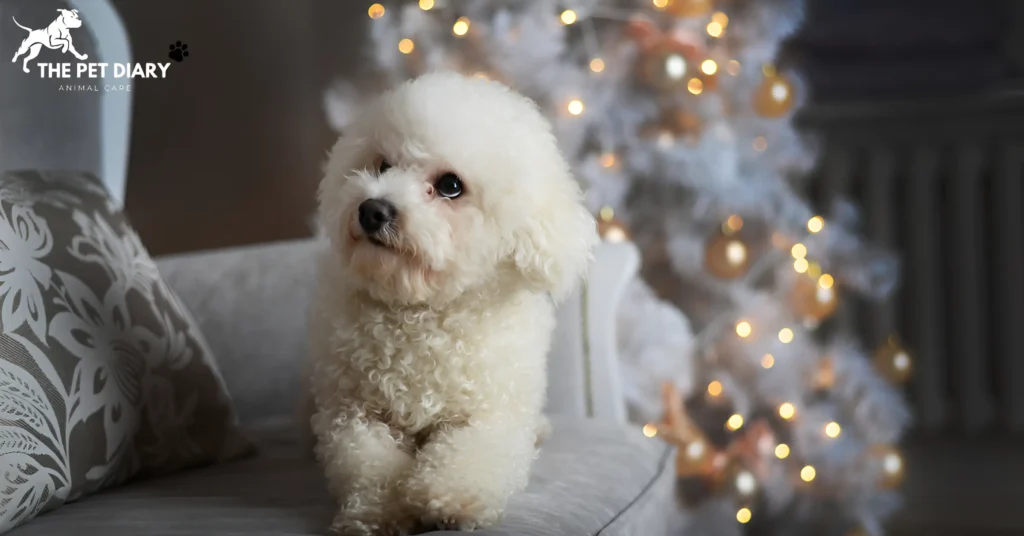
🐾Bichon Frise Personality and Temperament
Despite their high level of energy, Bichons Frise are also highly adaptive to their environment. Because of these characteristics, Bichons get along well with young children. Bichons also make great lap dogs and blend in well with most families due to their high level of socialization with people and other pets.
When properly trained and socialized from puppyhood, bichons become amiable dogs who feel at ease with strangers and other animals.
🐾Bichon Frise Behavior
Astute and outgoing Bichons Frise quickly get along with new people and animals. At home, bichons are kind, playful, and loving canines.
They enjoy playing and require a lot of love and care to be content. Bichons may resort to unwanted activities like excessive barking or chewing as a way to amuse themselves when they’re bored or lonely.
🐾Bichon Frise Training
The Bichon Frise is intelligent, fast to pick things up, and very trainable. They may pick up a lot of tricks and are keen to please their owners. Due to their intelligence, potty training and basic cues like “sit” and “stay” are usually rapidly mastered.
Fun Activities for the Bichon Frise Care Guide
- Playing tug-of-war
- Fetching toys
- Neighborhood walks
- Playing in the living room or backyard
- Lounging in their human’s lap
Bichon Frise Grooming Guide-Bichon Frise Care Guide
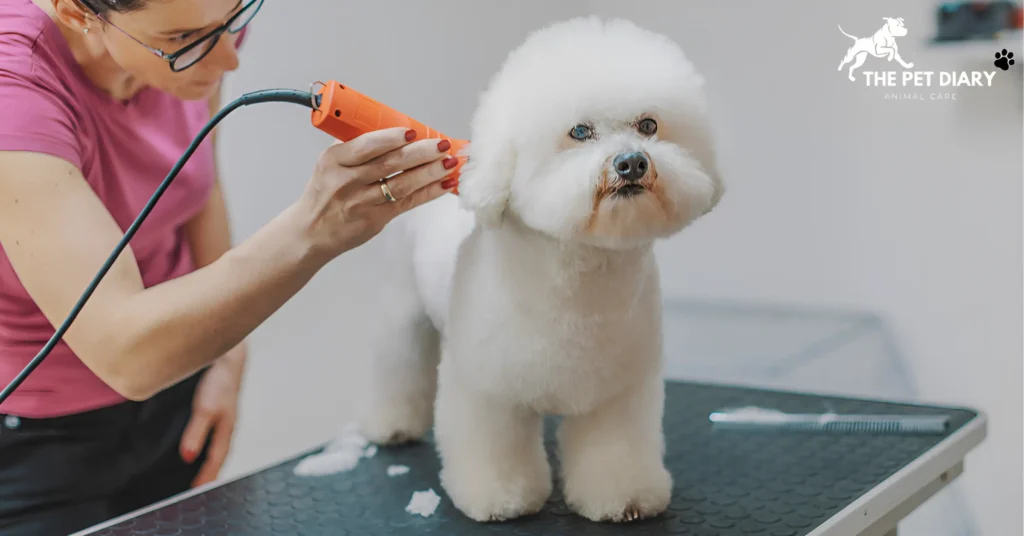
The Bichon Frise dog breed‘s long double coat of curling white hair requires a lot of upkeep.
They shed very little, and some individuals who are allergic to dogs may find them to be wonderful companions. Before taking home a Bichon Frise puppy, spend some time with the breed to observe how your allergies respond, as there is no such thing as a completely hypoallergenic dogs.
🐾Skin Care
Bathe your Bichon at least once a month. Your Bichon’s coat will remain silky and white with the use of high-quality dog shampoo and conditioner.
🐾Coat Care
Brush your Bichon Frise’s white coat every day to prevent matting. For them to maintain clean, clipped fur, they will also require monthly visits to a professional groomer. Budget for frequent grooming appointments.
🐾Eye Care
Bichons are susceptible to eye conditions, including cataracts and corneal dystrophy, so take your dog to the vet for a thorough health checkup every year. Talk to your veterinarian right away about excessive tears, squinting, or visual impairment.
Dog-safe stain removers and eye wipes can be used to clear the typical tear stains that these white canines may develop.
Considerations for Pet Parents-Bichon Frise Care Guide
Families with younger children would benefit greatly from owning a Bichon Frise puppy. Because of their diminutive size, they will thrive in apartments and can use the majority of their energy playing in the living room.
As long as their requirements are satisfied, they are not regarded as excessive barkers, even though they might do so in response to odd noises. The Bichon Frise is an extremely gregarious dog, and strangers soon become friends with them.
However, their grooming needs are high. Bichons must bathe at least once a month and clean their hair daily to avoid matting. Before adopting a Bichon Frise puppy, be sure you have the funds for professional visits and the time to devote to at-home grooming.
✨Conclusion✨Bichon Frise care guide
The Bichon Frise is a cheerful, affectionate, and adaptable little companion that fits beautifully into many types of households. With their playful spirit, intelligence, and eagerness to please, these dogs bring endless joy and companionship.
While their grooming needs require dedication, the reward is a stunning, fluffy friend with a heart full of love. Whether you live in a cozy apartment or a busy family home, the Bichon Frise is ready to be your loyal lap dog, playmate, and constant source of happiness. Visit Thepetdiary.com
❓ Frequently Asked Questions (FAQs)Bichon Frise Care Guide
1. Are Bichon Frises good family dogs?
Yes! Bichons are friendly, affectionate, and great with children, making them excellent family pets.
2. Do Bichon Frises bark a lot? Bichon Frise Care Guide
They may bark when excited or alert, but with proper training, they’re not considered excessive barkers.
3. Are Bichon Frises hypoallergenic? Bichon Frise Care Guide
They’re low-shedding and often recommended for allergy sufferers, but no dog is 100% hypoallergenic.
4. How often should a Bichon Frise be groomed?
Daily brushing and professional grooming every 4–6 weeks are needed to prevent matting and keep their coat healthy.
5. How long do Bichon Frises live?
The average lifespan is 14–15 years, with proper care, diet, and regular vet checkups.
6. What do Bichon Fries usually die from?
As they age, Bichon Frises typically pass away from conditions like cancer, heart problems, and renal failure. A Bichon Frise’s lifespan can be increased by following a proper care guide and scheduling routine veterinary examinations.
